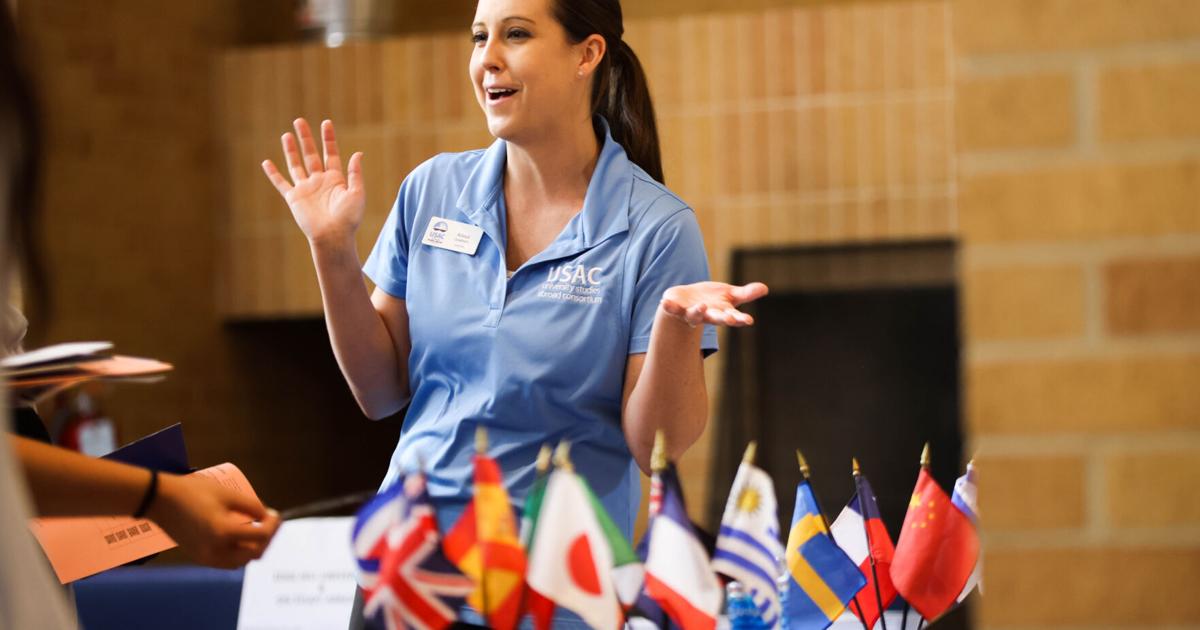Alissa Qualheim, University Studies Abroad Consortium program coordinator, speaks to students during the Study Abroad Fair on Sept. 13 at the Palo Duro Lounge in the University Center. The nonprofit organization provides students with over 50 study abroad programs in 26 countries.
The university can have two types of students: ones who have moved internationally to study at UTA, and locals who want to use UTA to study internationally.
Study Abroad’s spectrum of programs has something for either end of the spectrum. Students from both backgrounds, along with students who fit anywhere in between, lined up to explore their options in the Palo Duro Lounge Wednesday at the Study Abroad Fair.
The afternoon aimed to break down the over 500 study abroad programs students can choose from, offering options across around 60 countries.
Most programs can fall into three categories: affiliated, faculty-led and reciprocal exchange. Each type provides a different experience and can fit into degree plans differently.

Attendees read pamphlets during the Study Abroad Fair on Sept. 13 at the Palo Duro Lounge in the University Center. The fair showcased various locations to study, how to receive scholarships and courses offered.
Affiliated programs
Affiliated programs are partnerships between UTA and outside study abroad providers. The university is currently affiliated with about ten program providers that offer study abroad, internship, and volunteer programs in over 55 countries year-round, according to its website.
Students in these programs earn UTA resident credit and receive grades in a pass or fail format. They don’t pay tuition to the university, instead paying program tuition, housing, and other costs directly to the program provider.
As Mark Flores, biology and data science junior, weaved through the fair’s tables, he was specifically looking for a program that could take him to Japan. Though he wants the experience of studying in a different country, Flores also said that another, less academic reason drives him to Japan.
Flores is “kinda obsessed” with Japanese boxing, he said. He’s boxed for years, and that style of boxing is one of his weaknesses.
“If I can just even train at one local gym, just once in my life, it would be awesome,” Flores said.
Alissa Qualheim works as a program coordinator for University Studies Abroad Consortium, a nonprofit affiliated organization offering study abroad programs in over 25 different countries. Qualheim said their most popular programs take students to Spain and Italy, and they provide students with pre-departure support.
The organization aims to tackle the common concerns students often have, such as how they’ll afford the programs and how they can fit into a major.
“If you tell me a major, I bet I could find you a location that we operate where there would be at least one course that would work towards your major,” Qualheim said.
The organization has a team to help students navigate these “myths” around study abroad, she said. This includes helping them navigate housing options, cultural expectations and visa processes.

The American Institute for Foreign Study shares with students during the Study Abroad Fair on Sept. 13 at the Palo Duro Lounge in the University Center. The program provides traditional and internship programs where students can earn 12 credit hours during the fall and spring semesters.
Faculty-led programs
Students in UTA faculty-led programs earn UTA resident credit and receive grades as regular letter grades. Participants are charged regular tuition for university courses, which they pay directly to UTA. Housing and other related costs are paid according to the department’s procedures. These programs are also financial aid eligible.
The university usually offers 10-12 faculty-led programs each year, according to its website. The length of programs vary, though most take place in summer. Current outgoing programs are looking to send students to countries including Japan, Sweden and France.
Ray Elliott, professor of modern languages, is one of the faculty leading a group of students to Cuernavaca, México, next summer. Most participants go for Spanish-speaking purposes, taking courses including intermediate Spanish and Latin American culture and civilization.
As chair of Linguistics and TESOL, Elliot has been in charge of the program for about 18 years, excluding three years during the pandemic, he said. He will be joined by Cynthia Kilpatrick, associate professor of instruction in Linguistics and TESOL, who’s taking students working on their Teaching English to Speakers of Other Languages certificates.
Elliot said he loves seeing students benefit from being exposed to a new culture. But the trip to México also coincides with his research on the documentation and analysis of endangered and minority indigenous languages, allowing him to be closer to his area of study.

Global Engagement provides merch, treats and information during the Study Abroad Fair on Sept. 13 at the Palo Duro Lounge in the University Center. The department is a part of the Office of International Education, working to advance international education and intercultural learning.
Reciprocal exchange programs
Reciprocal exchange programs allow students to live in a new culture while taking courses at an exchange partner university. They’re available as semester or year-long studies, with limited options during the summer and winter.
Students receive UTA resident credit and grades in regular letter grade format. They pay tuition to the university, though housing and other related costs go directly to the host institution abroad. These programs are also financial aid eligible.
Participants register in courses labeled “EXCH,” which have a course number reflecting the class’s level and number of credit hours approved by the adviser. UTA’s website currently reports it has reciprocal exchange programs in 17 different countries.
Political science senior Estar Abraham said she learned about study abroad programs as a freshman when she attended an event similar to Wednesday’s. As she continued her major and focused on international studies, she found wanted to learn about politics outside the U.S.
“I walked into one of those tables and I’m like: ‘Okay, I think this is fun. I think I can do one of those one day, maybe,’” Abraham said.
Last spring, she got her chance, spending the semester in the United Kingdom studying at the University of Leicester. Abraham said she wasn’t worried about finances — tuition was about the same as normal, and she relied on scholarships and savings for her other expenses.
There were some challenges, like adapting to a new culture and getting used to public transportation. But after her experience, which let her travel across England, see centuries-old castles and attend King Charles III’s coronation, she’d give studying abroad her recommendation.
“You’ll be traveling, for less,” Abraham said. “You’ll be getting a lot of experiences — like academic-wise, life-wise, just general experience — for less.”
@Shawlings601






